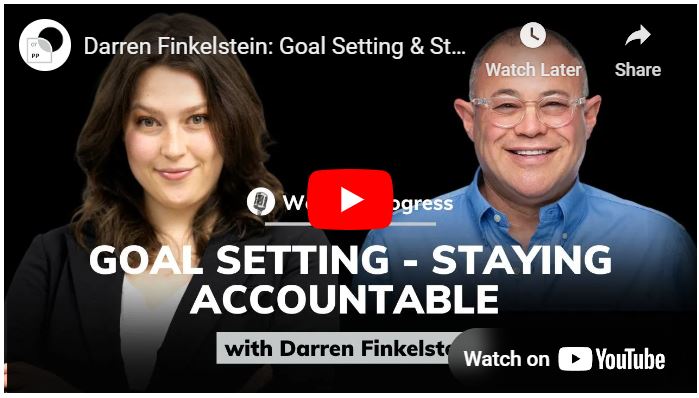Whether you’re prepared or not, starting a new business can be both exciting and overwhelming. It’s easy to become engrossed in the excitement of your idea and neglect one of the crucial steps—your business plan. Whether you’re launching a product, a service, or something in between, a written plan will help you clarify your vision, make smarter decisions, and stay on track.
A business plan isn’t just for ticking off investor requirements. It serves as a tool to steer your thoughts, prioritise your objectives, and aid others in understanding your journey. If you’ve never created one before, that’s okay. Here’s what makes it useful and how to assemble it, step by step.
Discover your Accountability Score and increase the probability of smashing your GOALS and Getting Sh!t Done!
Understanding The Importance Of A Business Plan
A business plan is a written outline that explains your goals, how you plan to achieve them, and what success looks like for your business. Think of it as a map to help keep your direction clear when things get busy, uncertain, or off-track.
Without a plan in place, it’s easy to lose focus or stretch your time and resources too thin. If you don’t plan how to implement and execute your good ideas in a timely manner, they will remain mere ideas, and you risk missing the opportunity! . A business plan brings everything together—your vision, your strategy, and your actions—and helps you move forward with purpose.
Here are a few reasons it’s useful:
– It defines your goals and timelines, which keeps them specific, rather than vague
– It helps you spot holes in your strategy before they turn into problems
– It gives you a better picture of what resources you need and how to manage them
– It shows others, like potential partners, what you’re aiming to do
You can think of a business plan like planning a long road trip. You need to know where you’re going, when you’ll arrive, what roads you’re taking, and what you’ll need along the way. Your plan provides you with a clear path to return to, even though surprises and detours may occur.
Steps To Creating Your First Business Plan
Every plan looks slightly different depending on the kind of business you’re starting. But there are a few basic pieces you’ll want to include.
1. Research And Analysis
Before writing anything down, spend some time researching. Understanding your market is key.
– Learn about current trends in your industry
– Identify your ideal customers. Who are they? What problems do they face?
– Look at similar businesses. What do they offer? Where could you improve on what they do?
This exercise is not just guesswork—it’s about paying attention to what’s already out there and finding out how your business fits.
2. Outline Your Business Goals
This is where you explain what you want your business to achieve, both now and later.
Set short-term goals like launching a website, offering a trial service, or making your first sale. Then look longer-term. Maybe that’s reaching a set number of customers in a year or expanding your range of services.
Use the SMART goal method to shape each one:
– Specific
– Measurable
– Achievable
– Relevant
– Time-bound
Breaking big ideas into smaller, trackable steps keeps you focused and motivated. Your plan isn’t about predicting the future perfectly—it’s about setting a direction.
3. Define Your Business Structure And Operations
How will your business be run day-to-day? You need to decide on your setup and workflow.
– Will you operate as a sole trader, register a company, or start a partnership?
– What tasks will happen regularly? Shipping products, meeting clients, sourcing supplies?
“Will you need any tools or software to stay organised?”
Getting this clear is advantageous not just for you but for any future team members or collaborators. If, for example, you’re setting up an online shop, your daily operations might include managing orders, tracking inventory, and responding to customer questions.
4. Financial Planning And Projections
At this stage, it’s time to get comfortable with the numbers. You don’t need to be an expert, but having a basic overview of your finances is important. I love a good spreadsheet which shows you what your financial future will look like based on some projections.
Think through:
– How much money will you need to get started?
– What will it cost to operate each month? Think of wages, rent, utilities, materials
– What income do you expect during your first 6 to 12 months?
Your financial section should give you an idea of when you might break even and where to keep an eye out for rising costs or slow periods. Even a simple spreadsheet will do. A rough forecast is better than flying blind.
If this section feels too tricky, it may help to speak with an accountant or business coach who knows how to put numbers into context.
5. Marketing And Sales Strategy
Now that you know what you’re offering, how will people hear about it? What strategies will effectively attract and convert new customers?
Start by considering:
– What do you want your brand to be known for?
– Which communication methods do your future customers use most—social media, emails, forums, or events?
– How are you going to keep the conversation going with people who show interest?
You don’t need to be everywhere from the start. Choose one or two channels and give them your full attention. Make your messaging clear, so when someone sees your business, they quickly understand the value.
Marketing isn’t just about spreading the word. It’s about building trust and leading each contact to action—whether that’s booking a call, subscribing, or making a purchase.
Common Mistakes To Avoid When Writing A Business Plan
Starting fresh often leads to avoidable mistakes. Here are some errors to watch out for:
1. Skipping market research
Believing in your idea is important, but you still need to check if others feel the same. Missing this step can lead to poor decisions later.
2. Guessing too high with financial goals
You want growth—but if your targets are unrealistic, you may quickly feel discouraged. Stick to achievable goals and build from there.
3. Writing goals that don’t mean anything
Saying “I want to succeed” doesn’t help you take action. Set goals that are specific and have a timeline.
4. Overlooking the competition
You don’t need to follow them, but you should understand what others are doing. It helps sharpen your message and shows what makes you different.
5. Never updating your plan
Your business will grow, and things will change. That’s normal. Updating your plan keeps it useful and relevant.
Being aware of these traps helps you write a plan that actually helps instead of one that just looks appealing on paper.
Getting Professional Help Makes A Big Difference
Some people put off getting help because they’re worried it means they’ve failed or can’t do it alone. But planning with support often leads to faster progress and fewer roadblocks.
A coach or mentor can examine your plan objectively, pose insightful questions, and provide candid feedback. More than that, they’ll help you stick with your plan—not just write it and forget it. They’ll also hold you accountable, which is important if you want to turn your goals into real results.
The value isn’t just in creating the plan—it’s about following through.
Setting Yourself Up For Success
After writing your business plan, the next step is to take action. Continue reviewing and updating it as your business grows. Use it to make decisions, track your results, and see what’s working or needs adjusting.
Check in on a regular basis, weekly and monthly as a bare minimum:
– Are you hitting your sales goals?
– Are customers reacting the way you hoped?
– Did any new trends or problems pop up?
Don’t be afraid to tweak the plan. It’s not meant to stay frozen. Please print it out, display the goals where they are visible, and discuss them during your weekly meetings.
When things shift, having a plan helps you adjust quickly without losing your way. It keeps your goals and team aligned. And it helps you build something sustainable—not just for now, but long-term.
Planning for your venture’s success is just the beginning. Consider working with a business start-up coach to help you navigate each stage with clarity and direction. With the right support, you’ll be better equipped to put your goals into action, sidestep common pitfalls, and build a business that grows with confidence.
“Tick Those Boxes” specialises in helping individuals and organisations become more accountable, which means doing what you say you are going to do and getting your team to do the same.
Contact our team to see how our programs may help you establish a more effective and accountable workplace, allowing you to do the things you say you will do and getting your teams to do the same.


